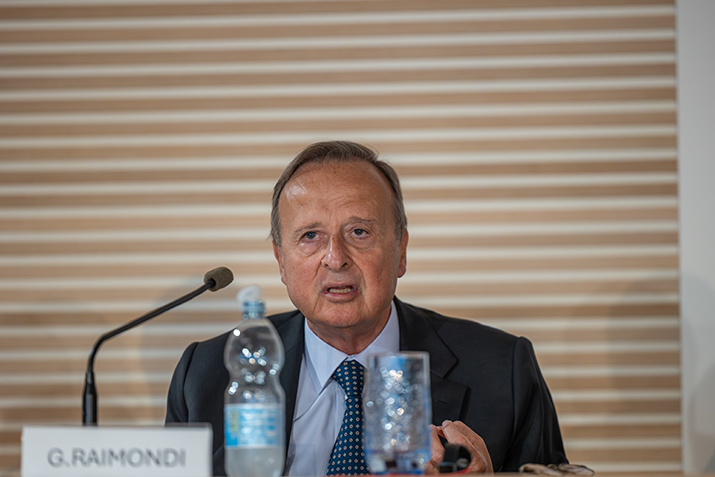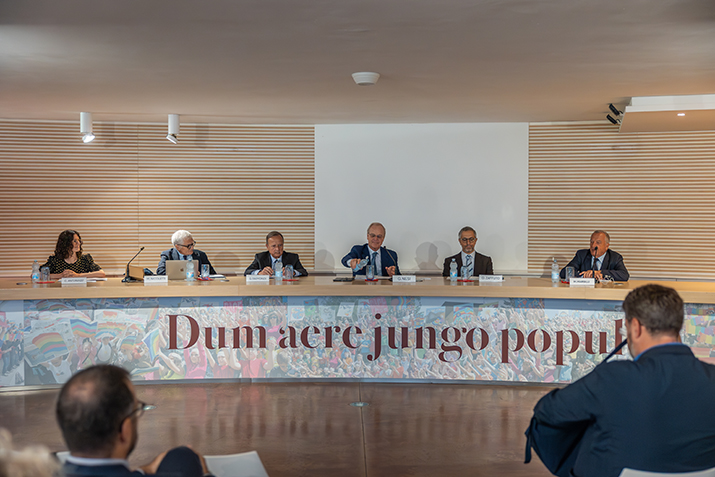SEMINAR AT THE BELL
THE PROTECTION OF HUMAN RIGHTS AND WORLD DISORDER: THE COUNCIL OF EUROPE'S RESPONSE
The European system of human rights protection, created by the European Convention on Human Rights (ECHR), is facing a convergence of crises that threaten its effectiveness and legitimacy. Two developments are emerging as particularly worrying: the systematic erosion of democratic principles in several European states and the profound impact of Russia's war against Ukraine on the European human rights architecture.
The most visible manifestation of democratic erosion in Europe has been the weakening of liberal-democratic institutions, especially in Hungary and Poland. Both countries have experienced what is known as the 'exaltation of the Executive', i.e. a tendency towards the concentration of power in the executive at the expense of democratic checks and balances.
These experiences are part of a broader trend throughout Europe. The European Parliament expressed deep concern, sounding the alarm in a Resolution of 28 February 2024 about 'a democratic backwardness in many Member States' and identified specific threats including problems with the independence of the judiciary, corruption, media freedom and the independence of supervisory authorities.
This democratic erosion poses direct challenges to the ECHR system in several ways. Firstly, it undermines the principle of subsidiarity that underlies the Convention system, i.e. the idea that national authorities should be the primary guarantors of human rights. The weakening of national guarantee institutions reduces the effectiveness of remedies at national level, so that individuals have to turn more frequently to Strasbourg, thus increasing the Court's workload and creating tensions with national governments.
Second, populist governments have increasingly used attacks on the Court as part of their broader narrative against international institutions and so-called 'corrupt elites'. These attacks often invoke the 'will of the people' to justify violations of minority rights and international obligations. The Court faces the challenge of maintaining its authority while operating in a context where its legitimacy is systematically questioned by some of the very states it is supposed to supervise.
In addition to the concerns related to the erosion of the democratic principle, there are also those related to the worrying geo-political context, most notably the gravity of the Ukrainian crisis, which ultimately led to Russia’s expulsion from the Council of Europe. The most dramatic institutional change in the Council of Europe’s 75-year history occurred on 16 March 2022, when the Committee of Ministers decided that Russia would “cease to be a member of the Council of Europe,” following its large-scale invasion of Ukraine on 24 February 2022 — a decision without precedent since the organisation’s founding in 1949. Russia’s expulsion had immediate repercussions for the ECHR system, resulting in the country’s withdrawal from the Convention itself from 16 September 2022.
On 9 July 2025, the Grand Chamber of the European Court of Human Rights issued one of the most significant judgments in its history in the case of Ukraine and the Netherlands v. Russia.
This unanimous decision found Russia responsible for widespread and flagrant human rights violations committed over a period of more than eight years, from 2014 to 2022. The range of violations for which the Court held Russia accountable is extensive. These included indiscriminate military attacks; summary executions; acts of torture, including the use of rape as a weapon of war; unlawful and arbitrary detentions; intimidation and persecution of journalists and religious groups; looting and destruction of private property; and the organised transfer of Ukrainian children to Russia, followed by their adoption there. The judgment is also important from a jurisprudential point of view with regard to the issues of jurisdiction and attribution. The Court ruled that Russia exercised jurisdiction and was therefore obliged to comply with its obligations under the Convention with respect to the territory it occupied in Ukraine.
It is against this challenging backdrop that we must consider the future of the Convention system. A backdrop made even more complex by renewed political pressure on the Strasbourg Court.
In May 2025, a coalition of nine EU Member States - Italy, Belgium, Denmark, Estonia, Lithuania, Latvia, Poland, the Czech Republic and Austria - published an open letter criticising the interpretation of the Convention by the European Court of Human Rights, in particular with regard to migration cases. The petitioners argued that the Court had 'excessively broadened the scope of the Convention compared to the Convention's original intentions, thereby altering the balance between the interests that should be protected'. They criticised in particular the Court's jurisprudence on the expulsion of criminal foreign nationals, arguing that it prevents effective migration management. The letter was widely criticised by human rights organisations and legal experts. Nevertheless, it remains a relevant fact that must be duly taken into account.
The European Convention on Human Rights system faces an unprecedented convergence of challenges that threaten its effectiveness and legitimacy. These challenges intersect with emerging pressures that will shape the future of human rights protection in Europe. The Court's groundbreaking jurisprudence on climate change has opened up new frontiers for the protection of rights, while at the same time generating a political reaction from the States concerned about excessive judicial power. The rise of artificial intelligence and algorithmic decision-making presents technical challenges that will require new interpretative frameworks. Climate-induced migration threatens to overwhelm existing protection systems while highlighting gaps in international law.
Looking to the future, the ECHR system must adapt to remain effective while preserving its fundamental mission of protecting human rights and fundamental freedoms. This requires an institutional approach that improves transparency and accountability while maintaining the independence of the Strasbourg Court. The challenges facing the Convention are not only technical or legal problems, but reflect wider tensions in European society regarding identity, sovereignty and values. The way forward requires the recognition that the ECHR system, like the democratic societies it serves, is not a fixed entity, but a living institution that must evolve to remain relevant. However, this evolution must be guided by the fundamental values that inspired the creation of the Convention: namely, the conviction that human dignity transcends national boundaries and that international cooperation is essential for the protection of the rights and freedoms that make democratic life possible.
Guido Raimondi

Guido Raimondi during his speech at the seminar







